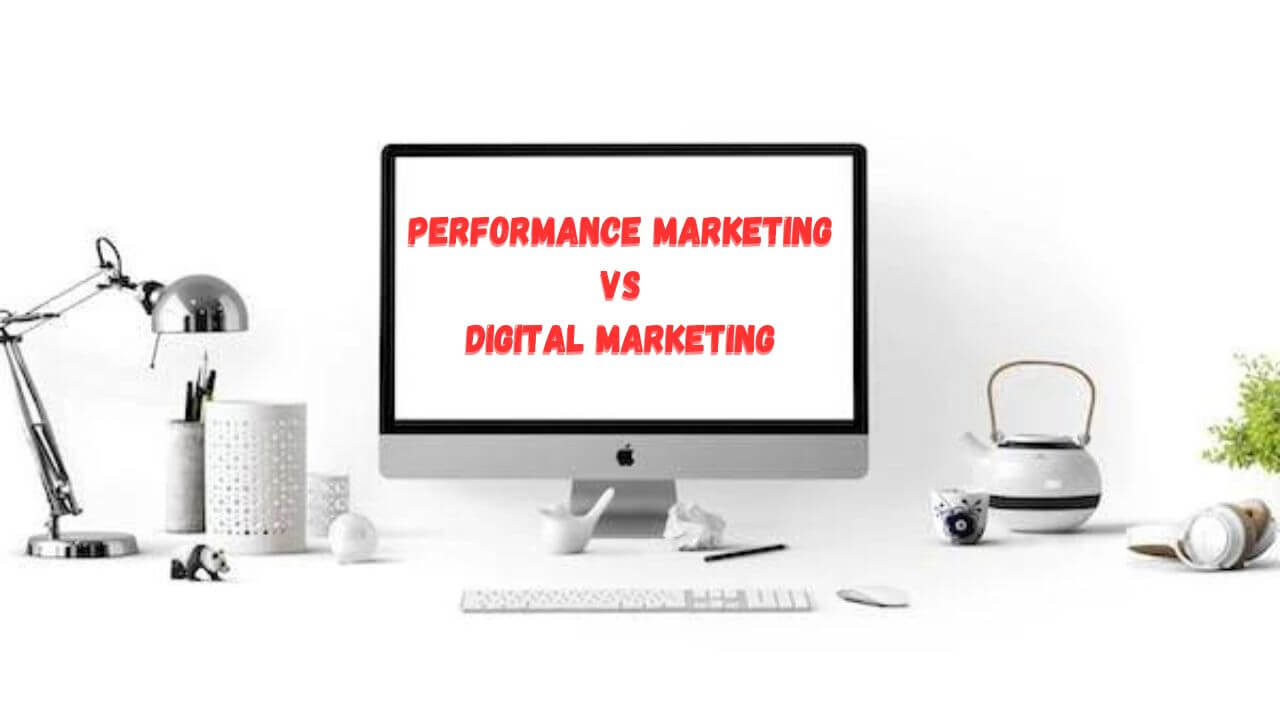
INTRODUCTION
Welcome to the era of digital dominance, where marketing strategies shape the success of businesses. This blog is to explore the differences between two powerful marketing approaches: Performance Marketing vs Digital Marketing. Join us as we explore the nuances, benefits, and features of these strategies, enabling you to make an informed decision about which one best suits your business objectives.
What is Performance Marketing & Its Benefits?
Performance marketing is a data-driven approach that focuses on driving specific actions or outcomes, such as conversions, sales, or leads. It offers advertisers the ability to track and measure the performance of their campaigns, optimize strategies in real time, and allocate resources efficiently based on tangible results and ROI.

Benefits of Performance Marketing:
Targeted Approach: Performance marketing enables businesses to reach their target audience with precision. Through advanced targeting options, such as demographics, interests, and behaviors, marketers can tailor their campaigns to the specific needs and preferences of their ideal customers, increasing the likelihood of conversion.
Enhanced Conversion Rates: Performance marketing strategies focus on driving specific actions, which often leads to higher conversion rates. A business can improve conversion rates and drive more valuable actions by optimizing campaigns based on data and continuously refining targeting, messaging, and user experience.
Cost Efficiency: With performance marketing, businesses only pay for actual results. Instead of spending a fixed budget upfront, advertisers pay based on specific actions, such as a sale or a lead generated. Cost efficiency ensures that marketing resources are allocated effectively, maximizing ROI.
What is Digital Marketing & its benefits?
Digital marketing is the practice of leveraging digital channels and technologies to promote products, services, or brands. It covers a variety of methods, such as SEO (search engine optimization), Social Media Marketing, Content Marketing, email marketing and also whatsapp marketing India. In the digital realm, digital marketing helps businesses reach and engage their target audience, drive conversions, and accomplish marketing objectives.

Benefits of Digital Marketing
Global Reach: Digital marketing enables businesses to reach out to a worldwide audience, regardless of where they are located. The internet allows for widespread access, making it possible to target and engage with potential customers worldwide.
Cost-Effective: Traditional marketing methods are often more expensive than digital marketing. Online advertising platforms offer flexible budgeting options, allowing businesses to optimize their spending and achieve better ROI. In addition, digital marketing tactics such as social media and content marketing can be implemented relatively inexpensively in comparison with traditional advertising methods.
Targeted Audience: Digital marketing allows you to select specific audiences based on characteristics, demographics, interests, and other criteria. This method of targeting increases the chance of contacting the right individuals that are inclined to purchase your offerings or services.
Improved Customer Engagement: By using social media channels, email marketing, live chats and other channels on the internet through which you can interact directly with customers. This facilitates two-way communications, which allows you to answer the customer’s questions and issues quickly, and build stronger relationships with your customers.
Types of Performance Marketing
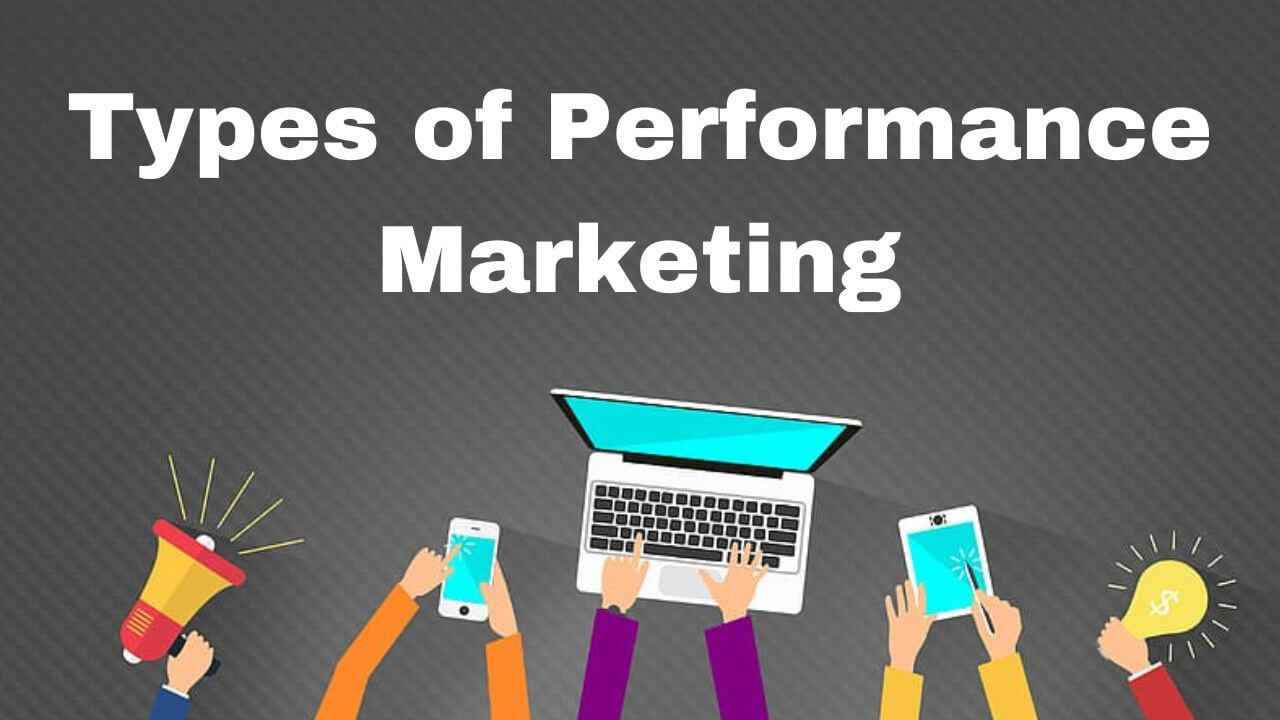
Affiliate Marketing: In affiliate marketing, businesses partner with affiliates who promote their products or services. Affiliates are rewarded with a commission for each sale, lead, or action generated through their marketing efforts.
Pay-Per-Click (PPC) Advertising: PPC advertising or PPC marketing is the process of placing ads on search engines and different websites and those who advertise pay just when the advertisement is clicked. This type of model lets businesses direct specifically targeted visitors to their sites and pay for clicks that occur.
Cost-Per-Acquisition (CPA) Advertising: CPA advertising focuses on paying for a specific action or acquisition, such as a sale or a lead. Advertisers pay a fixed fee or a percentage of the sale or leads generated through their ads.
Influencer Marketing: Influencer marketing makes use of influential people or social media stars to promote products and services. Advertisers work with influencers to reach their target audience, and compensation is often determined by the results, which include clicks, conversions or engagement.
Cost-Per-Acquisition (CPA) Advertising: CPA advertising is focused on paying for an specific event or purchase for example, the sale or lead. The advertiser pays a set price or a portion of the lead or sale generated by their ads.
Types of Digital Marketing
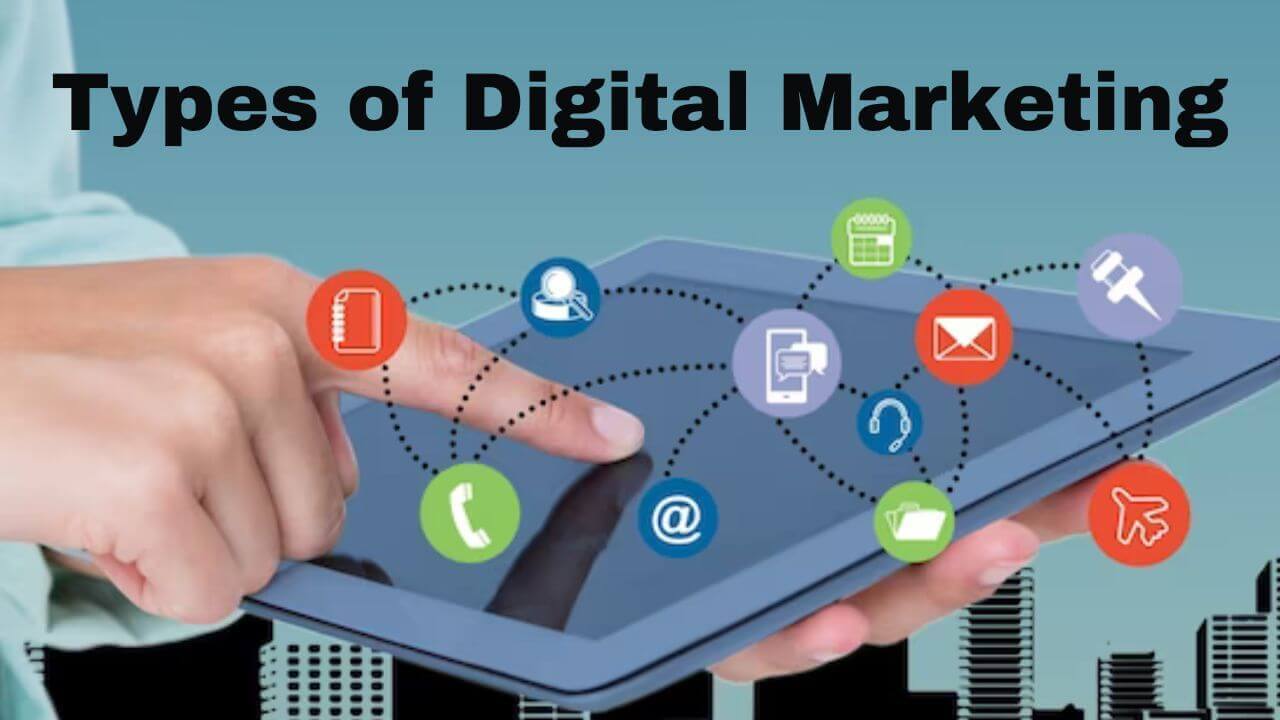
Search Engine Optimization (SEO): SEO focuses on improving a website’s visibility in search engine results pages (SERPs) organically. It is the process of optimizing the content on websites and meta tags, URLs, and other elements to be more prominent in search results and thereby driving higher organic (non-paid) visitors to the site.
Search Engine Marketing (SEM): SEM refers to paid advertising on search engines. It involves creating and optimizing paid search campaigns using platforms like Google Ads. Advertisers bid on keywords to display their ads in search engine results and pay when users click on their ads (PPC).
Social Media Marketing: Social media marketing uses platforms on social media like Facebook, Instagram, Twitter, LinkedIn, and others to connect and connect with a targeted group of people. It entails the creation and sharing of posts, ads, and fostering interactions to create brand awareness, increase web traffic and create leads and sales.
Content Marketing: Content marketing is the process of creating and distributing relevant, high-quality content that is engaging and appealing to the audience you would like to reach. Content marketing comprises blog posts, articles and videos, infographics, ebooks, and more. The objective is to offer relevant information, create the status of thought leaders, and ultimately improve conversions and increase customer loyalty.
Check out the best digital marketing courses in Thrissur, and if you have any queries about digital marketing, you can consult the best digital marketing coach.
Role of Performance Marketing
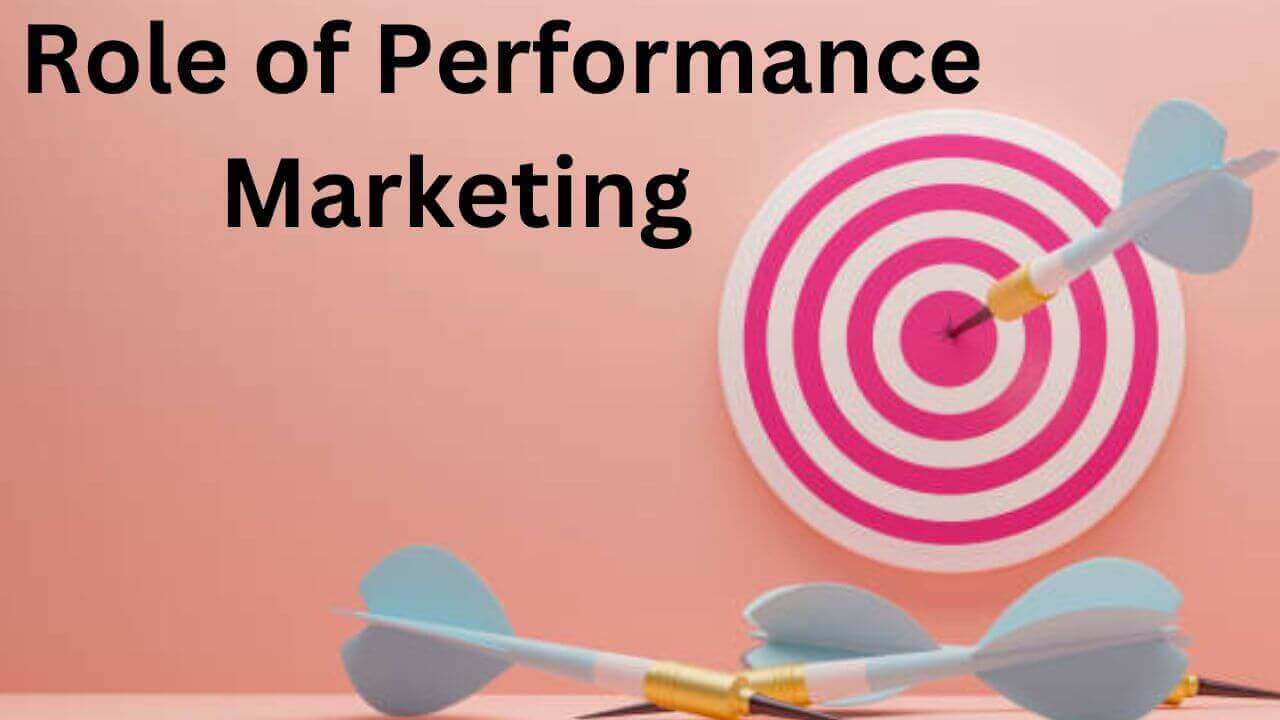
Cost Efficiency and ROI Optimization: Performance marketing prioritizes cost efficiency by ensuring that advertising spending aligns with the desired outcomes. Advertisers closely monitor their campaign costs and adjust bidding strategies, ad placements, and targeting to maximize return on investment (ROI). This approach helps optimize the marketing budget and allocate resources to the most effective channels and tactics.
Targeted Advertising: Performance marketing allows businesses to target their marketing campaigns to certain audiences based on characteristics, demographics, interests or other relevant factors. This method of targeting assists in reaching the correct people with the correct message at the right moment.
Real-time Optimization: Performance marketing makes use of real-time data and insights to make instant adjustments and improvements. Advertisers can observe the effectiveness of their ads in real time, allowing them to identify areas where they are not working and quickly make the needed adjustments. This flexibility allows advertisers to react quickly to changing market trends, consumer habits, and competitor activities.
Measurable Metrics: Performance marketing is based on data-driven metrics and important performance indicators (KPIs) to monitor and assess campaign performance. Marketers evaluate the metrics like the conversion rate, click-through rate and CPA and cost-per-acquisition (CPA) along with return on advertising spending (ROAS) to evaluate the effectiveness and efficacy of their campaigns.
Role of Digital Marketing
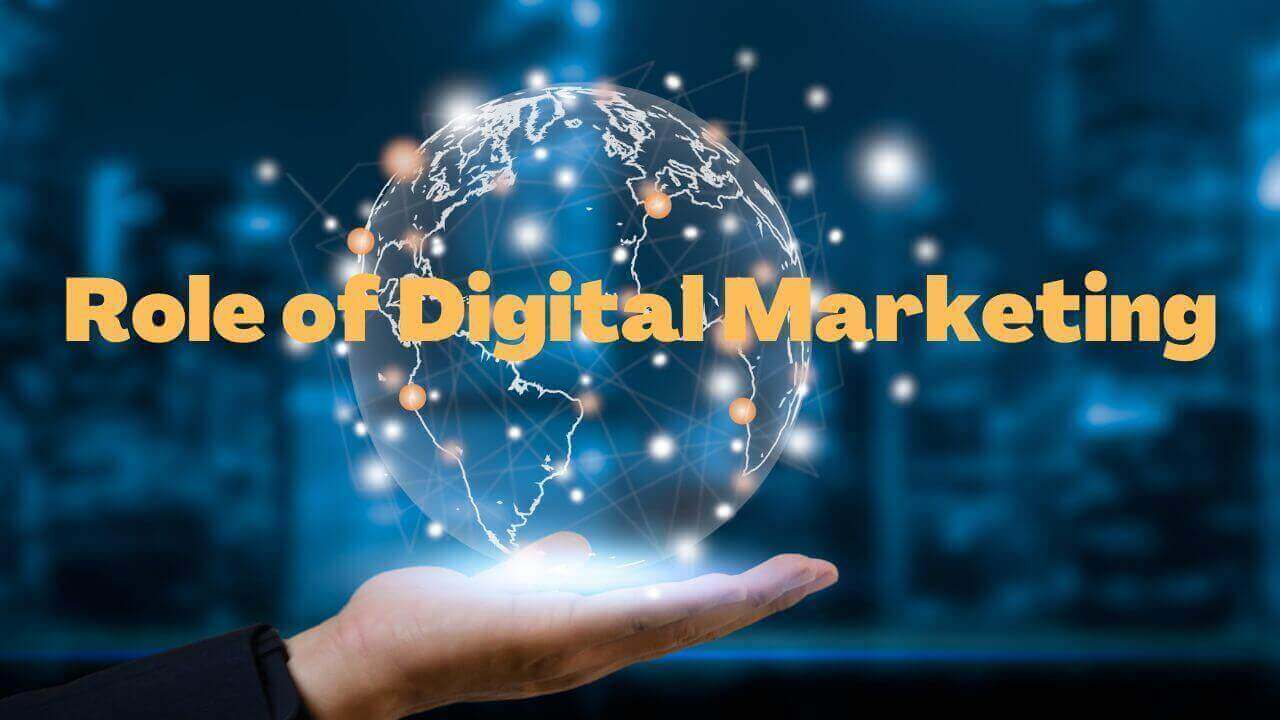
Brand Awareness: Digital marketing can help businesses establish and improve their brand’s visibility online. Through channels such as social media websites and the use of content marketing businesses can display their brand’s image and values and distinctive selling points to a broad audience.
Audience Targeting: Digital marketing permits specific audience targeting. Businesses can find and target certain segments of their targeted audience according to demographics, interests and behaviors and other aspects. This enables targeted and relevant messages, which increase the chance of engaging potential customers and increasing conversions.
Lead Generation and Conversion: One of the major objectives of the digital market is to create leads and turn them into customers. Utilizing strategies like search engine optimization (SEO) and pay-per-click (PPC) marketing as well as content marketing and the use of lead magnets companies can draw prospective customers and help them navigate the sales funnel. Digital marketing allows for targeted messages and effective methods to boost conversions efficiently.
Customer Engagement: Digital marketing gives businesses to connect directly with their target audience. Through social media interaction, email marketing, live chats, and community forums, businesses can create two-way communications and establish connections with their customers. This type of engagement builds trust, loyalty and satisfaction among customers, which leads to more business and positive word-of-mouth.
The role of digital marketing can be seen in the growth of many companies. One such example is the marketing strategy of Patanjali. Read more about the scope of digital marketing in India
Key Features of Performance Marketing
Targeted Advertising: Performance marketing focuses on targeted targeting of the audience. Advertisers make use of information and information about the audience to determine and focus on specific segments that are susceptible to conversion. This method of targeting enhances the effectiveness and efficiency of advertising campaigns.
Conversion Tracking: Performance marketing uses the tracking of conversions to observe user behavior and connect the actions to certain marketing initiatives. This allows marketers to comprehend the effect of their marketing campaigns, optimize their conversion funnels and connect income or other desired outcomes specifically to marketing campaigns or channels.
Measurable Results: Performance marketing focuses on the achievement of certain, quantifiable results like sales, conversions or leads. It insists on using KPIs or key performance indicators (KPIs) to monitor and evaluate the performance of marketing campaigns in a precise manner.
Read more about the guide to getting the best performance marketing jobs
Key Features of Digital Marketing
Cost-Effective Advertising: Digital marketing can provide low-cost advertising alternatives compared to traditional methods of marketing. With specific targeting and the ability to control budgets, companies can maximize their advertising budgets and allocate resources efficiently and improve their ROI. Digital advertising platforms typically provide various flexible budgeting options that allow businesses regardless of size to take part.
Targeted Audience: Digital marketing offers precise target audience based on demographics, interests, behaviors, and other criteria. This enables businesses to deliver personalized and relevant messages to specific segments, increasing the likelihood of engagement and conversions.
Real-time Analytics: Digital marketing gives access to live information and analytics that allow companies to monitor and assess the success of their campaigns. This method of data-driven marketing allows marketers to make educated decisions, improve strategies, and improve ROI.
Click here to choose the best digital marketing trainer in Kerala and for more job details best digital marketing jobs in Kochi.
Comparison between Performance marketing vs Digital marketing
Performance marketing and digital marketing are two interconnected aspects of modern advertising. While digital marketing encompasses a broader range of strategies, channels, and objectives, performance marketing focuses specifically on driving measurable results and optimizing campaigns based on data and analytics.
Conclusion
Digital marketing covers a broad variety of strategies and goals. Performance marketing is an area of marketing that is focused on measurable outcomes and optimization based on data. Both methods play an important role in the modern world of advertising, however, performance marketing is an apprehensive and focused approach to achieving goals in marketing.
